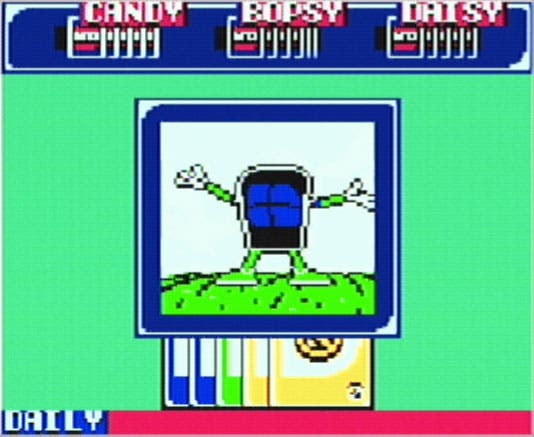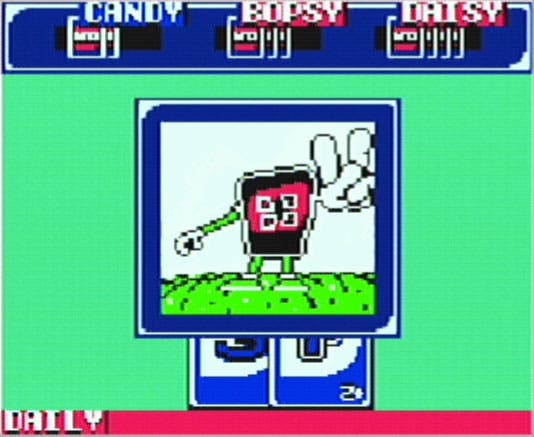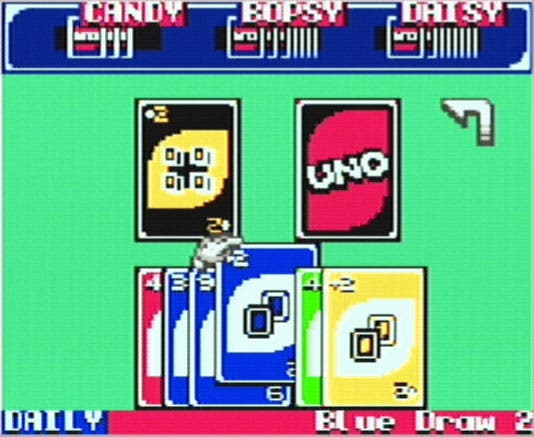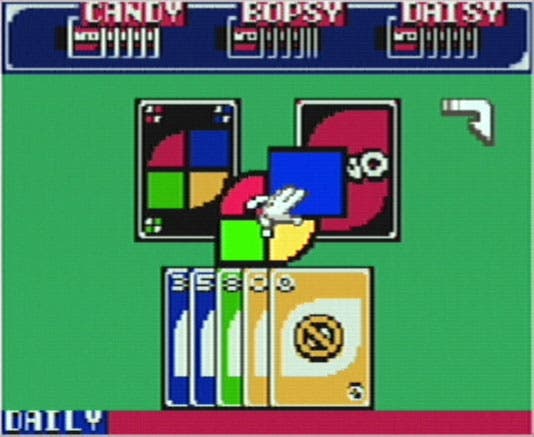Uno!
Review - we investigate a card-carrying GameBoy

Uno!
It's about time that the GameBoy got its own card game. The PC versions of Solitaire, Hearts and Freecell which have been included with Windows since the dawn of time have for all intents and purposes become the most popular computer games in history. Along with Minesweeper, the games have defined gaming with a PC, and if my own laptop is anything to go by, see more use than any work-related program out there for mobile businessmen. As such it's really quite startling when you realise that before Uno, the GameBoy Color had very little in the way of card games to keep the player occupied. No wonder then that developers HotGen decided to work on it whilst other programmers in the company beavered away on the GBC conversion of Resident Evil, it's the perfect stop-gap. But at £20, it is just a card game. How worthwhile is the expenditure at such a price? And how good an implementation of the classic holiday card game is it?

Two's company
There may be those of you who have never heard of Uno, a Mattel-licensed concept. Thankfully, it's very simple to get the hang of, which no doubt sits in its favour as a pick-up-and-play GameBoy title. The idea is that 6 cards are dealt to each player, and the person who runs out of cards first, wins! The cards come in four colours and are numbered 0-9. First of all, a card is placed on the table, and the first player has to put down a card of equal number or the same colour, and so on, round in a circle. If a player cannot do this, he takes a card from the bottom of the pile and things continue. When a player is down to just one card, he or she has to claim "Uno!" If you forget to do this, your sly opponents get to chuckle maniacally and you are forced to take a further two cards from the pile. If alarm bells are ringing in your head, don't be surprised. It's played all over the globe, as the long nights draw in, usually in summer weather on the south coast of France I've found, and can easily be played with a standard deck of 52 cards, by using cards Ace-9 or similar. The Mattel version is simply a little easier to use, from a purely aesthetic point of view.

Handled
On the GameBoy, there are two versions of the game to check out. Both can be played against three other computer players or three friends via link-up. First off is plain-vanilla Uno, except in order to win you need to collect points. These points are the total of the cards left in your opponents' possession, so the better you are, the faster you win. In the other version, Challenge Uno, it's pretty much the other way round. When you lose a round, you keep the points amassed from your own cards, and when you hit a certain amount of points you drop out. This works quite well, but often you end up with two particularly unlucky players going out pretty much simultaneously. Nevertheless, both versions are entertaining and quite addictive, especially with human players controlling the other cardplayers.

Cheat!
However, Uno has three very distinct problems associated with it on the GameBoy. Firstly, you are expected to hit the "Uno!" button ever so quickly when you're down to one card, and on countless occasions I would lose a round simply because I hadn't managed to hit it in time. This is of course one of the quirks of the game as a whole, but the amount of time allotted to this simple motion is far too small. The second issue is down to the human factor, but is nonetheless rather annoying. When you're playing Uno out on the patio with your friends, you or one of your friends are in charge of shuffling the cards, in full view of you, and you have no real qualms if the pack consistently goes against you, since it's just bad luck. But if the pack goes against you very often when the computer is the dealer you sometimes wonder just how fair the whole thing really is. Although it's a physical impossibility to show the computer shuffling and dealing the cards in front of you, you do resent being treated with anonymity. Finally, in an attempt to bring some fun to proceedings, there is an animated Uno card, which performs in-between rounds and such. And it is the single most annoying thing I have encountered since that sodding paper clip in Microsoft Office. You can turn it off in the Options menu, and you will certainly want to do this. After about three seconds.
Conclusion
Although ultimately it's just a card game, it is a very addictive card game. It's not like Solitaire in its approach; it's very hands-on and fast-moving, but you do feel compelled to keep playing for just one more round, and I've found throughout my time using the GameBoy that there is no higher recommendation.








